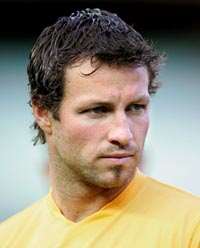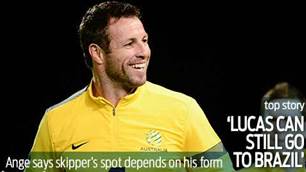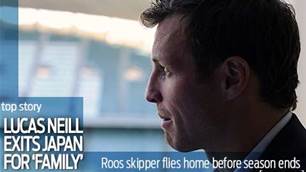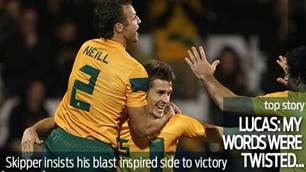The new poster boy of Australian football has substance to go with his undoubted style. And with the temperament of a leader, the captain’s armband beckons...
Page 2 of 3 | Single page
Being an instant rock star in your own home town must be a strange...
“Yeah, it’s been a long time coming,” he says. “It’s nice to be getting some acknowledgement for our success on the field. It’s very humbling to have people always wanting to come and have photos with you and get autographs. There’s a real hype surrounding it, which is great because it fills stadiums and now makes our jobs a whole lot easier. I suppose we feel pleased with ourselves that we’ve been partly responsible for that with our success on the field.”
Off the field, Neill is very measured and thoughtful. As a player who has been in the squad since 1996, he now represents the generation that is bridging the gap between the older group (Schwarzer, Moore, Kewell) with the new generation (Kennedy, Beauchamp, Sarkies). As someone who outwardly seems so suited to the role, does he feel like he’s a leader?
“I feel like an important part of the team and I suppose because of my position on the field I have to communicate a lot and I have a very important role,” he laughs. “So as a result of that, yeah, I suppose I feel responsible. It’s nice to know that people look to you for leadership qualities and I like that responsibility. And when people look toward you all the time you have to be performing at your best and playing the way people expect you to play because they’ve put you on that pedestal.”
Ex-US President Franklin D. Roosevelt once said, “A good leader can’t get too far ahead of his followers.” Neill certainly has the respect of his team-mates and the way he earned it was the best and quickest way to do so – with his performances.
In the four games of our World Cup campaign, Neill was by far our most consistent player. In hindsight, it may be said that it was naïve of Neill to go to ground in desperation against Italy, but without his contribution we would certainly not have been in the knockout stages in the first place. Neill saved our bacon on a number of occasions in all three round robin games.
With the adulation of the public so overwhelming, Neill is well aware that he has inspired a new generation of young Australian footballers. But he remains coy about how much effect and inspiration he has had over the younger Socceroos, even though he himself was in awe of the senior players when he first joined the ranks.
“No, I don’t know whether they are or aren’t looking [to him as inspiration]. But I’m going to try and influence them and pass on what I’ve learnt in the game just like the guys that are older than me did for me when I was younger. It’s all a learning curve and if I can help my team-mate, whether he wants help or not, it’ll help the team.
“If you can get five or six strong personalities in the team then naturally it makes the team a better performing team. It makes you more organised and as a result it means you win more than you lose. There’s a lot more to leadership than just wearing an armband,” he says.
Who exactly did Neill himself look up to as a young Socceroo? In his debut game against Saudi Arabia in 1996, the team had names including Carl Veart, Kevin Muscat, Paul Okon, Steve Corica and Paul Agostino as well as Popovic, Kewell, Schwarzer and Kalac.
“All of them!” he responds. “All of them for all sorts of different reasons. You know, I don’t want to single out any one particular player because I think it could be insulting to other players if I didn’t mention them so… In every team you go into you always listen to what the older guys have to say because they’ve obviously been around a long time and they know what the differences are between right and wrong. As long as you don’t use it all as gospel but try and take something out of every lesson, then that puts you in a good position.”
“Yeah, it’s been a long time coming,” he says. “It’s nice to be getting some acknowledgement for our success on the field. It’s very humbling to have people always wanting to come and have photos with you and get autographs. There’s a real hype surrounding it, which is great because it fills stadiums and now makes our jobs a whole lot easier. I suppose we feel pleased with ourselves that we’ve been partly responsible for that with our success on the field.”
Off the field, Neill is very measured and thoughtful. As a player who has been in the squad since 1996, he now represents the generation that is bridging the gap between the older group (Schwarzer, Moore, Kewell) with the new generation (Kennedy, Beauchamp, Sarkies). As someone who outwardly seems so suited to the role, does he feel like he’s a leader?
“I feel like an important part of the team and I suppose because of my position on the field I have to communicate a lot and I have a very important role,” he laughs. “So as a result of that, yeah, I suppose I feel responsible. It’s nice to know that people look to you for leadership qualities and I like that responsibility. And when people look toward you all the time you have to be performing at your best and playing the way people expect you to play because they’ve put you on that pedestal.”
Ex-US President Franklin D. Roosevelt once said, “A good leader can’t get too far ahead of his followers.” Neill certainly has the respect of his team-mates and the way he earned it was the best and quickest way to do so – with his performances.
In the four games of our World Cup campaign, Neill was by far our most consistent player. In hindsight, it may be said that it was naïve of Neill to go to ground in desperation against Italy, but without his contribution we would certainly not have been in the knockout stages in the first place. Neill saved our bacon on a number of occasions in all three round robin games.
With the adulation of the public so overwhelming, Neill is well aware that he has inspired a new generation of young Australian footballers. But he remains coy about how much effect and inspiration he has had over the younger Socceroos, even though he himself was in awe of the senior players when he first joined the ranks.
“No, I don’t know whether they are or aren’t looking [to him as inspiration]. But I’m going to try and influence them and pass on what I’ve learnt in the game just like the guys that are older than me did for me when I was younger. It’s all a learning curve and if I can help my team-mate, whether he wants help or not, it’ll help the team.
 |
| Blue Steel or Magnum? |
“If you can get five or six strong personalities in the team then naturally it makes the team a better performing team. It makes you more organised and as a result it means you win more than you lose. There’s a lot more to leadership than just wearing an armband,” he says.
Who exactly did Neill himself look up to as a young Socceroo? In his debut game against Saudi Arabia in 1996, the team had names including Carl Veart, Kevin Muscat, Paul Okon, Steve Corica and Paul Agostino as well as Popovic, Kewell, Schwarzer and Kalac.
“All of them!” he responds. “All of them for all sorts of different reasons. You know, I don’t want to single out any one particular player because I think it could be insulting to other players if I didn’t mention them so… In every team you go into you always listen to what the older guys have to say because they’ve obviously been around a long time and they know what the differences are between right and wrong. As long as you don’t use it all as gospel but try and take something out of every lesson, then that puts you in a good position.”
Related Articles

Ange: Still a place for Lucas in Brazil

Lucas Neill flies home to Australia













